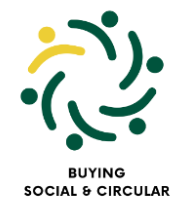La Città Verde” takes part in a new project aims to boost partnerships between mainstream businesses and social enterprises

La Città Verde” takes part in a new project aims to boost partnerships between mainstream businesses and social enterprises
RREUSE and its members have launched a project to open new doors for social enterprises’ partnerships with mainstream businesses: “Buying Social and Circular – Social Enterprises and Private Sector Partnerships (BuySocCirc)”. The 18-month project is supported by a grant from the European Commission under the SMP COSME programme.
The project aims to incentivise, support, and accelerate social circular enterprises’ access to private procurement. With RREUSE in the lead, the eight-member consortium will examine current practices and deliver their practical, on-the-ground, expertise on setting partnerships with the private sector.

To build the capacities needed to enable local, regional or national business to business market partnerships and trade relationships between social economy entities and mainstream businesses – the goal set in the call for project proposals – BuySocCirc will:
– Map examples of cooperation and/or private procurement of social enterprises products or services in the circular economy;
– Identify key success factors and barriers to overcome for cooperation;
– Provide recommendations and guidance of how successful businesses-to-business (B2B) can be fostered;
– Develop a geospatial mapping tool to identify and match-make social enterprise partners active in the circular economy with private sector actors.
The project consortium is composed of individual social enterprises as well as regional and national networks of social enterprises active in re-use, repair and recycling from across the European Union, namely: RREUSE, RE-Use Austria, Asociación Española de Recuperadores de Economía Social y Solidaria (AERESS, Spain), Ateliere Fara Frontiere (AFF, Romania), Humana Nova (Croatia), ENVIE (France), La Città Verde (Italy), Herwin (Belgium).
Funded by the European Union. Views and opinions expressed are however those of the author(s) only and do not necessarily reflect those of the European Union or [name of the granting authority]. Neither the European Union nor the granting authority can be held responsible for them”
